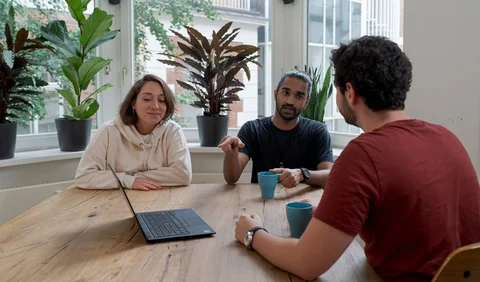
It’s been a tough stock market and venture market recently for startup tech companies. Since the market has corrected, capital is becoming precious again. As a result, many early-stage companies are looking to fill up the tank a little more or they’re going back to existing investors for capital in order to survive.
One of the most important things to remember right now is that outside investors are busy triaging their own portfolios. It’s the beginning stages of a tough time, which means venture capitalists are paying attention to their own portfolios first and foremost. They want to ensure those are in a good place.
Keep in mind, VCs aren’t going to be wide open for business right now. While they will still take meetings, most of their attention is on their existing portfolios.
In this post, we’re going to break down how to ask existing investors for money.
Why you should approach existing investors
Going to your existing investors is going to be the fastest, quickest, and easiest way to raise capital right now. These are the folks that know you, they know your traction, they’ve been tracking you, and they know the kind of person you are. Plus, it will make the due diligence process easier.
They know everything: How organized you are, how good of a decision maker you are. And, because they’ve already invested in the company, they have incentive to protect it. They are more likely to want to invest in your company, depending on where you are.
Startups that are doing well have an advantage
If you are a rocket ship company, this is a great time for you. People will pay attention. If you’re doing really well, this is a good time to open up the last round of financing and raise some extra capital at that valuation. It may seem painful and unfair, because you likely made a ton of progress off the last round of valuation.
Take solace in knowing that the last round was probably raised at a very aggressive valuation. You likely maximized the valuation. When you reopen the round, you’ve giving a little back to the VCs. They are there when times are tough. They support you. So, it’s not the worst thing to open the round at the last valuation.
While it’s not the ideal situation, it’s what needs to be done if you need more capital or if you have a 12-month runway and you need to get to 18 or 24 months. Then, it’s the right time to open up the last valuation.
Startups with shorter runways should consider their milestones
Some companies may be have a shorter runway (6-12 months) and are closer to their zero cash date. However, they may be close to reaching a key milestone, such as releasing a product and acquiring customers, or being able to cross over $1 million in revenue, or perhaps they’re planning to sell the company.
In that case, the company is just looking for a little extra gas in the tank. These are all good opportunities to raise capital. Your company can point to something that’s going to move the needle for the VCs. Remember they have ownership position. They are existing investors.
But you are asking for extra capital, and there’s a saying that people don’t want to throw good money after bad money. In other words, you need to prove to them that you have the goods, and this will be a good investment for them.
To the extent that you have to do a downround - which many of our clients are considering - your existing investors should be the first people you talk to. However, they may want to have a new investor price the round - there are a lot of dynamics that come into play when a startup does a round at a lower valuation. Read our guide to downrounds to get more information.
The bottom line
If you have 24 months of cash on hand, then there’s no reason to do anything. There’s no reason to open up the last round or to ask for a bridge. You may want to raise a little extra venture debt.
If you want more information on going back to investors to raise capital, check out our blog that breaks down VC fund reserves. It will help you understand how VCs make decisions and what percentage of the fund is actually held in reserves.
If you have any other questions on startup funding, please contact us.








